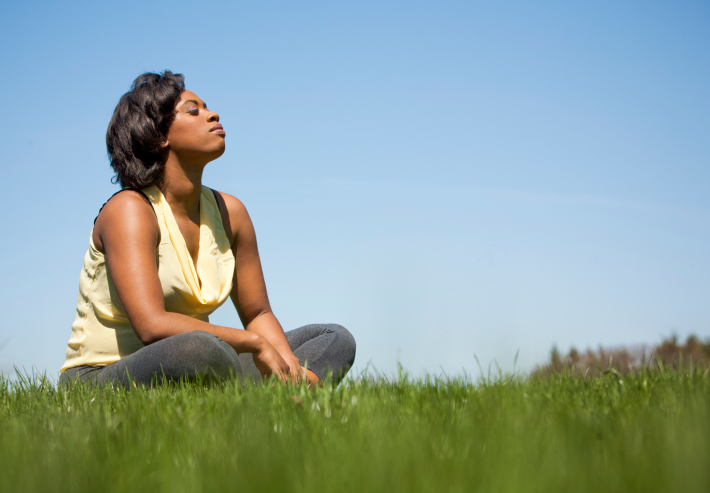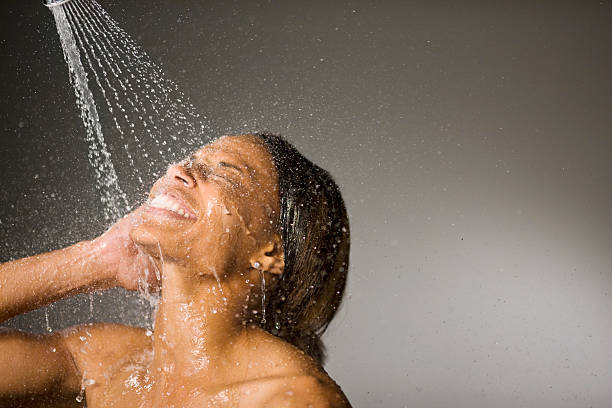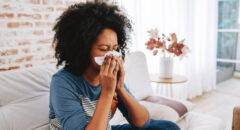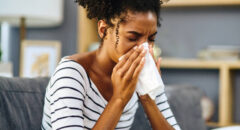
Are dry, itchy eyes hiding behind those dope sunglasses? The warmer months can be brutal for anyone with seasonal allergies, and summer fun-in-the-sun may bring even more allergy symptoms.
If you've noticed that your allergies go into high gear this time of year, here are a few things you might be doing to make allergies worse (and what you can do about it!).
1. Wearing your outside clothes inside.

Grandma had it right when she told you to take off your shoes and your "play clothes" when you entered the house. The soles of your shoes have grooves, perfect for trapping allergens.
Walking around your house in the same shoes and clothes that have been exposed to the outside elements you just sneezed in is perpetuating the spread of pollen in your house.
Leave your shoes at the door, take off your clothes and throw them into the laundry basket to decrease the risk of spreading pollen in your house. All those friendly (and not-so-friendly) reminders from your mother about not sitting on her bed with your outside clothes make a lot of sense now, right?
READ: 5 Ways To Conquer Summer Allergies
2. Opening windows too soon.

Don’t be so thirsty to open those windows as soon as it gets hot. Although you may have a screen protector on your window blocking you from certain outside elements, you’re still at a high risk of inviting airborne elements from the trees, such as molds and pollens, which can trigger allergies with the blow of wind.
Leave windows closed during peak pollen hours and try using an air conditioner with an allergy filter to remedy your need to feel the breeze.
3. Showering only once a day.

Pollen counts kick up in the summer, so be sure to switch up your bathing habits. Spending a lot of time outside means that you’re more susceptible to coming in contact with pollen. Pollen is extremely flighty and finds ways to attach itself to any surface. Although you might not see pollen on your clothes or feel it on your skin, trust and believe, it’s there. Shower immediately upon entering the house, or at the least, before going to bed.
4. Drinking alcohol.

Who doesn’t like partaking in a little something something when the weather gets hot? But did you know that drinking alcohol increases nasal allergy symptoms? When you sip that mimosa, glass of Hennessy with no ice, or even a simple wine cooler' it increases the blood flow to the linings of your nose.
This increased blood flow exacerbates the body’s production of histamines leaving you and your allergies on ten. Any type of alcohol will do this and make you feel nasally. If you suffer from nasal congestion and other seasonal allergy symptoms that affect your nostrils, you should probably lay off the joy juice.
5. Eating 'trigger' foods.

Seasonal allergies will make you an instant doctor, for real. It’s important to keep a journal or mental note of what your body is telling you. Cross-reactivity is an allergic reaction that occurs when the proteins in one substance (most often it’s pollen) are similar to the proteins found in another substance (typically a food).
For example, you could be eating an apple and feel this itch in your throat. You’re probably thinking to yourself, “Hmmm... I eat apples all the time and don’t have a problem.” According to cross-reactivity, it's because of the allergens present in birch tree pollens that the apples come from. Certain allergens are only present in high amounts during certain seasons.
RELATED: 4 Tips To Avoid Complications With Seasonal Allergies
6. Inhaling strong scents.

Your nose does more than just detect who is funky at the day party. If you’ve ever been out and started to sneeze unexpectedly, it might come from a person you’re around wearing a really strong perfume. These strong odors can irritate the nasal airways and lungs, causing you to cough or sneeze.
Other culprits of this out-of-nowhere sneezing could be the dyes in cosmetics, cleaning products and chlorine from the pool. Be especially mindful of cleaning products because they can also cause an allergic reaction called dermatitis. It causes itching, and rashes and will leave you scratching and clawing for relief, literally.
7. Skipping your allergy medication.

I know how I am. I’ll forget in a heartbeat to take my allergy medicine. Or I’ll say to myself, “I don’t need allergy medication because I’m about to go to sleep.” Wrong, wrong and wrong again.
A lot of allergy medications only last for 6, 8 and maybe 12 hours. Be mindful of what the recommended dosage is and strictly stick to it.
Lapsing on your doses will do no good in shielding your body from allergies. If you’re going to forget, try taking 24-hour medicines like Zyrtec and Allegra to cure your woes.









